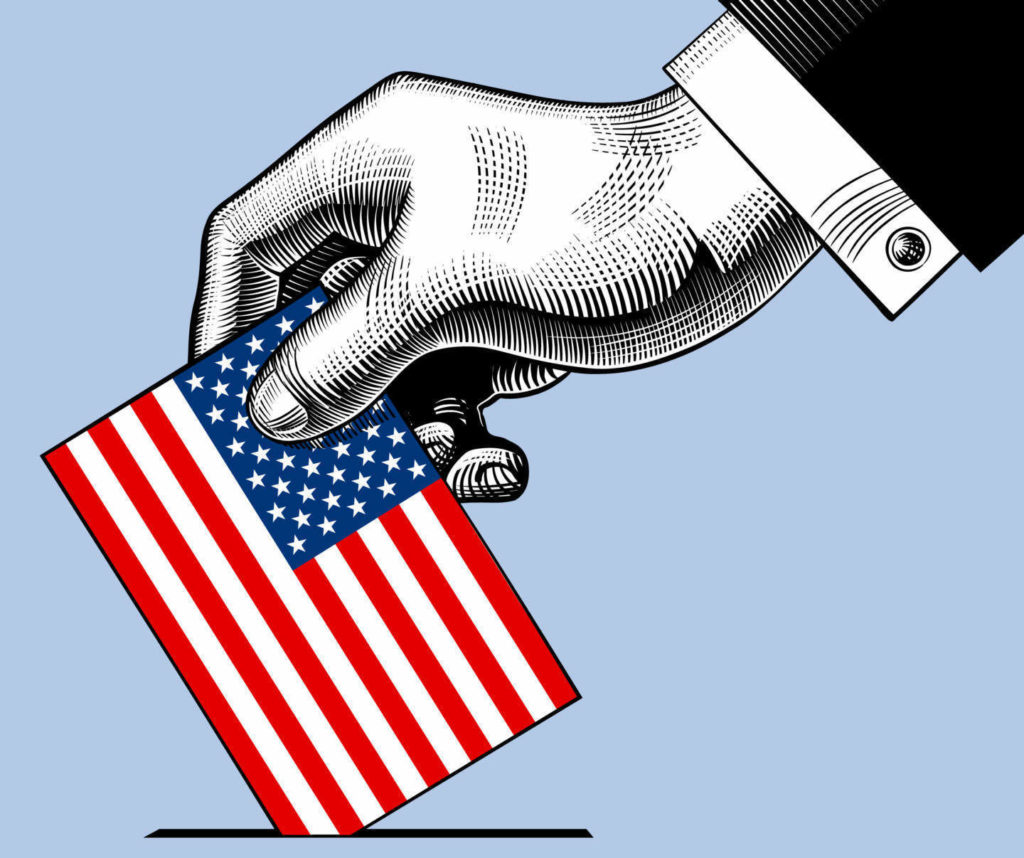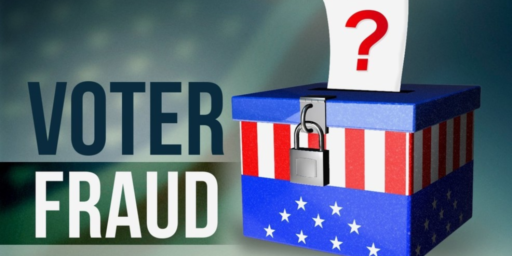A Return to the (Lack of) Evidence of Significant Fraud
A CPAC speaker and the return of the problem of the Heritage electoral fraud database.

Back in December, I wrote a post about electoral fraud (The Reality of Electoral Fraud) wherein I was highly critical of the Heritage Foundation’s Electoral Fraud database. In fact, that post led to a video chat with representatives from Heritage about my critiques. It was a friendly interchange, although no one much changed their mind insofar as I came away feeling like the database was quite problematic, and they did not agree with my concerns (save, perhaps, regarding some technical suggestions).
A major concern I had about the database (really, it is more a list of cases than a database) is that people would focus on the number of convictions noted in the database (1,130 as I write this) and not put those cases in context.
It is true that the list of cases (1,311) and convictions (1,130) in that list demonstrates that, yes, people do commit crimes linked to voting and elections. However, it does nothing to tell us much of anything else (even though people draw conclusions from just the numbers and, to be honest, so does Heritage’s description on the database’s homepage–more on that below).
For example, if I give crime statistics about your neighborhood and I say that there have been 1,130 criminal convictions in your neighborhood. You might find that alarming. Most people hear “crime” and they assume assault, robbery, murder, rape, etc. It makes them feel insecure. But if one finds out that those convictions were over an almost four-decade period and that the vast majority of them were things like speeding and parking tickets, minor possession of marijuana (the kid down the street was caught with a blunt), small-scale tax evasion, or other crimes unlikely to create threats to their families, persons, or property, it changes what the number means.
I would argue that is what Heritage’s database does, it correctly notes that election-related crime happens, but it provides no context that is useful for understanding those numbers and, in my view, creates a false impression.
Fundamentally, data need context to include the amount of time under discussion, the broader universe of overall actions, and clear definitions and categories in which to sort the information.
And, look, it is fair to note that a given list or database is just a collection of information. But what it is called matters for perceptions about what the information is and it likewise matters as to how the information is classified within the list itself. There is also the matter of scope, which needs to be clear.
When we speak of electoral fraud (broadly defined) in the USA, we aren’t talking about a neighborhood, but rather about a continental country that has had a large number of elections with millions upon millions of votes cast over the last four decades.
Beyond the number of convictions being quite small relative to the number of elections staged and votes cast over an almost 40 year period, there is the problem of definitions. The database treats the term “electoral fraud” (and sometimes “voter fraud”) very nebulously. It ignores the fact for most people fraud of either the electoral or voter type means a fraudulent ballot was cast and it suggests that the election results cannot be trusted. But, as I noted in my post in December, the Heritage list contains things like minor candidates being illegally given ballot access or minor bribery actions linked to petition-signing. Those are and should be, illegal, but they are not what most people think of when they hear the term “electoral/voter fraud.”
One reader of the December post tried to sort through the database to find types of crimes, and found, for example, 264 cases of ineligible voting and 11 cases of impersonation fraud. Those are truly minuscule numbers for one national election, let alone in multiple elections across time.
One of my concerns about the Heritage database (which I expressed in my chat with them) is that it is often used by people who want to make far broader (and unsubstantiated) claims about our elections, and I had (and have) specific concerns about people trying to use the list to bolster claims about 2020.
All of this brings me to true inspiration to this post, a speech by Deroy Murdock of the National Review at CPAC. Specifically, this clip (the second Tweet):
The whole speech (or, at least, most of it, is here via FNC).
Murdock is in inveighing against the notion that electoral fraud is not that big of a problem. He provides the Heritage database as a foundational part of his argument and emphasizes that it shows 1,130 convictions for electoral fraud. Indeed, he verbally underscores that number and forthrightly proclaims “so don’t tell me that vote fraud is some right wing hallucination.”
However, in my math-based opinion that number (especially when broken down into different categories) is so small as to be near to nonexistent in terms of system-level critiques. It may not be a hallucination, but it is a mirage on the horizon, a mistaken perception shimmering beyond reach that is not real.
Any human endeavor will have imperfections, so no shock US elections have people violating the rules. The goal should be commensurate and proportional responses to those imperfections. Not, as seems to be the goal for Murdock and company, massive overreactions to the problem that will simply result in making voting harder (and not, by the way, addressing most of the crimes on the Heritage list).
Murdock does not state, it is worth underscoring yet again, that the database stretches back to 1982. He does define what “voter fraud” or “electoral fraud” is. He provides no context on the relative number of votes case since 1982. No, instead be makes it sound that a) there is a real problem, and he just proved it by citing Heritage, and b) therefore Republicans are simply trying to protect the integrity of elections.
Side note: I am 100% in agreement that electoral integrity is important. And if Murdock and others who are concerned about things voter ID and voter registration rolls want to have free and universal ID cards and automatic registration of voters (the best ways to assure key elements of electoral integrity) I am there with them. Let’s do it.
But if “electoral integrity” is code for “making it harder for people to vote” then we have a problem especially when it is unclear that those measures really do much for security and integrity. Nothing being proposed by the GOP would cut down on bribing the homeless with cigarettes to sign ballot initiative petitions in CA, for example (several of the convictions on Heritage’s list are for this crime).
Worse, he asserts at around 4:42 in the linked video from FNC that “The Democrat Party is the part of vote fraud” (and yes, he repeatedly said “Democrat Party”). So, the degree to which this is purely about election integrity and not about partisan politics is more than a bit dubious, let’s say (and yes, partisan politics at CPAC is like gambling in Casablanca, so I get that).
His “evidence” was as follows from 2020:
- Democrats promoted mass mail-outs of ballots to voters (which he suggests led to ballots being filled out by random persons and submitted).
- Democrats supported side-walks drop-off boxes for ballots (which he intimates led to fraud because of lack of supervision).
- Democrats sought to relax signature-verification processes (which he asserts led to forged ballots being counted).
- Democrats blocked GOP observers from counting rooms.
So, let me note again for emphasis: he took the convictions from the Heritage list of various election-related crimes sans context or definitions and then connected it directly to 2020. His discussion of 2020 was almost entirely innuendo. But, it was all put forth as being of a piece: that there is fraud (because Heritage proved it) and therefore there was fraud on a massive scale in 2020.
Never mind that there is nothing even close to what he alleged about 2020 in the Heritage database. He repeated, for example, the weird story of late-night “dumps” of votes (from cars with out-of-state license plates, of course) and made a number of assertions about what might have happened, but apart from noting affidavits, he cited nothing concrete.
And while it is no surprise, can I just note the utter irresponsibility of continuing to push unsubstantiated lies about the 2020 elections like this to a crowd of activists in light of the Capitol Insurrection?
All of this is to point out a few things.
First, my criticisms of the Heritage database have deepened the more I have thought about it. It presents itself as something that it isn’t (or, if one is going to be charitable, it presents itself in a way that it is far too easy for others to misinterpret what it is, as Murdock did).
The description of the database at the Heritage sites states:
And each and every one ended in a finding that the individual had engaged in wrongdoing in connection with an election hoping to affect its outcome — or that the results of an election were sufficiently in question and had to be overturned.
That sounds pretty serious. I would note that by the database’s own limited search function, of the 1,130 convictions, 21 (1.9%) involved overturned elections. Since this database covered any election at any level for almost 40 years, that strikes me as proof we don’t have a serious fraud problem, rather than the opposite. (We are talking thousands upon thousands of elections and hundreds of millions of votes, to be conservative in my estimates).
If you want the database to be a list for others to use as a research tool, don’t highlight the most egregious outcomes in your description. It creates a false impression since most people aren’t going to look and see what the relative occurrences of specific crimes in the list are (especially with such a clunky search tool).
Indeed, before I started looking at the list myself, I had assumed that the number of convictions was linked to actual cases of fraudulently cast ballots, so I would not surprised if others also make that assumption.
Second, it is dangerous for people like Murdock and organizations like CPAC to continue to fuel this myth about fraud, especially if they are going to do it using the anemic evidence in the Heritage list to bolster bold, yet utterly unsubstantiated claims about 2020.
Third, if we want to bolster electoral integrity, that is a worthy goal. But don’t use the phrase “electoral integrity” to mean “making voting harder.” And don’t point to supposed evidence in the past to prove assertions in the present just so that you can make it harder for American citizens to vote.
Fundamentally, if the concern is better security of electoral outcomes, then present solutions that would incorporate heighten security and ease of access to the ballot box. But if the net result of those “solutions” is to “bolster security” while correspondingly making it harder to vote (especially in ways that likely help your party and not the other) then it is rather obvious what the actual goal is.
Start with free, easy to obtain, universal IDs and create, along with them, universal registration that could be managed a lot better than our current mishmash of state rules and voter rolls. If the goal is accuracy, let’s make the whole system more accurate. If you want people to present IDs, give them all IDs. Put the money where your mouth is, and stop saying “electoral integrity” when your goals will result, instead, in voter suppresion.
Put another way: if you think that lesson from 2020 is that we need more election security, let’s address that. However, if you really think the lesson in 2020 is that too many of the wrong people voted, you are actually not interested in integrity, you are interested in damaging democracy.





1,130 documented instances of voter fraud over 40 years in the entire country, and you think that’s a problem? That wouldn’t alter a typical race for county sheriff.
@Jay L Gischer: The lack of any sense of proportion is amazing.
And, I would again note, not 1,130 fraudulent votes, but 1,130 convictions of election-related crimes.
I suppose they have to push this notion for fear of being declared pariahs.
Another shortcoming of most uses of the database is people don’t distinguish between retail fraud, individual voters behaving badly, and wholesale fraud, election officials behaving badly. As I recall from thumbing through the database, most of the cases where an election result was changed were wholesale fraud. And to be scrupulously fair, in many (most?) of those absentee ballots were the mechanism used. In old nearly antique absentee systems. One of the reasons that contemporary vote by mail systems score so well on security is that they have lots of safeguards against wholesale fraud.
I have no idea why “if” is in that sentence. Do you really think for one second that Heritage didn’t set out to make the database deceptive? Or at least did so when they saw the paucity of data?
Hmm, this is very similar to other phobias I have seen. For instance, you can’t talk someone out of their fear of bees, because every once in a great while someone does die of a bee sting. So it’s out of proportion, not irrational, per se. That makes it a very stable system in that the most likely way someone tries to counter it – arguing against it’s being rational – instead tends to reinforce it.
However, I know a lot these days about dealing with phobia. The method usually used is called “exposure therapy”. (Ahem, this is why I always speak up when trans fears are discussed). The more you observe the thing feared. Like you might look at pictures of bees, or read about bees, or then move to film about bees, and do this for a while until you are ready to watch a live beehive or swarm.
You need some willing cooperation from the person with the fears, though. This can be tricky at first.
So, how to apply this to voter fraud? I think a political approach of “let’s look seriously at it and publish the results!” would work well. Kobach’s investigation got buried in the media, because he didn’t find anything, and that didn’t fit the narrative.
One of the great ways to do this sort of thing is a bet. You have to have operational criteria – it has to be easy to assess who won the bet. But that’s a person-to-person thing really.
So, what if someone with deep enough pockets said, “I will pay $1,000 for information leading to a conviction of voter fraud (definitions go here)” and took the data an published it, along with the amount of money paid out. I mean, “3 million illegals voted in California” is your claim? Show me! There’s a lot of money to be made.
And when you pay out, make sure everyone knows about it! You don’t want them to think you’re hiding.
Honestly, that money could easily be more effective than if spent on ads.
@Michael Cain: An excellent point.
@gVOR08: Let’s just call that a Lincolnian bought of “charity towards all” and that they can answer that question in their own hearts and minds (as we all can).
But I will say that I think that the Heritage list is a typical lawyerly way of arguing, especially in terms of civil case with a standard of “preponderance of the evidence” so if you can stack a big pile of stuff on the desk, the jury finds in your favor (I am being simplistic, no doubt).
But that isn’t how social science works, nor is it really how logical argumentation works. It isn’t just volume, it is quality, and the issue isn’t about winning a simple argument, but it is about understanding complex reality. The story of that list does not comport with the description that Heritage gives it, nor does it serve the logical and evidentiary role that Murdock wants it to.
@Steven L. Taylor: The actual number of fraudulent votes is much higher — remember the North Carolina case where a Republican candidate’s campaign committed massive absentee ballot fraud.
https://www.nytimes.com/2019/02/21/us/mark-harris-nc-voter-fraud.html
This is in the Heritage Foundation’s database. Which is a pretty shitty database and needs a “votes affected” column.
Clever Republicans would have seized on that case, and used that as the poster child fraud case that serves as the narrative behind all of their “voter integrity” vote suppression. They already lost the case, so they heave nothing to lose now, and it would appear to be more genuine as it’s not partisan.
1. Commit crime
2. get caught
3. Claim it shows the crime is easy to get away with (how many weren’t caught?!?)
4. Enact new restrictions that just prevent brown people from voting.
I went to CPAC twice in the early 2010s. James came to the first one I was at but not the second. There was a noticable change in tone at the first and second ones with the conference moving much further to the right in the second one. Perhaps this isn’t surprising since the second one had speakers like Trump and Sarah Palin. I was in the bloggers lounge for the Trump speech and basically left while he spoke. When Palin delivered her keynote speech I left and hung out at the bar with friends at the bar. In fact the main reason I went to the second conference was to catch up in real life with people I communicated with online. There was inevitably a lot of drinking and that visit was highlighted by a night with a guy I had met online who was a GOP fundraiser and polling analyst. He’s not someone you’d know from the public. A group of us took the limo he had hired for the conference and had a great time. After that adventure he and I went on a bar hopping trip that ended with us at a D.C
strip club for hours. I won’t reveal his name because what happens at CPAC stays ar CPAC.
Anyway I was told by people who went to CPAC after that that the conference kept drifting further and further to the right after that beginning in 2012. When Trump became a thing in 2015 I would watch parts of it on C-Span by 2016 it had drifted into the nutty territory and after he was elected it became something resembling a Bund Rally from 1930s Germany. It sounds like this is still the case after Trump’s loss based on what I’m seeing and hearing. Basically what was once called conservatism is now a cult with no dissent permitted and people like Liz Cheney, Mitt Romney, and Mitch McConnell be become the enemy for pointing out the truth about Trump.
@Gustopher: Indeed. One of the things I told the guy who manages the database is that it needs a way to identify the number of votes affected.
@Doug Mataconis: CPAC is, on one level, clearly a bit of a clown show. It feels like, from afar (I have never attended) a sort of Star Trek convention for a particular kind of conservative.
I would love to ignore it, but it really does seem to be connected to the Republican Party in ways that are more than a bit disconcerting.
(And glad to see you back!).
@Steven L. Taylor:
There’s a Matt Labash article in the old Weekly Standard in which he relates attending a Star Trek convention and CPAC; he points out all the similarities.
The article was written in…1996.
Of course, you know this, Steven, but the goal isn’t remotely ‘more accuracy.’
The goal is damaging democracy, while claiming to care about election integrity. The goal is to call the opposition lying crooks, while claiming your side is merely seeking the truth. The goal is the suppression of the popular vote, while claiming to care about the People. (Because to broadly appeal to the American public would require an adjustment in right wing policy or the occasional backing of a Democratic policy – like Biden’s COVID package that’s polling at 70% favorable.)
The lack of evidence of fraud is a feature not a bug for the Right. Evidence of fraud would point to real failure modes in our electoral system which could potentially be mitigated. Faith that there is fraud in the absence of evidence is a fountain of youth for the tenet put forth by Lindsey Graham shortly after the votes were counted in November, “We [Republicans] need to fight back. We win because of our ideas and we lose elections because [Democrats] cheat us.”
@Scott F.: To be abundantly clear, what Graham is saying here isn’t merely about The Big Lie 2020. This is an evergreen statement that in his party’s worldview applies to every race in the country, for every office up & down the ticket, and for every election the Republican doesn’t win.
And I really don’t think I am being hyperbolic.
[Non-Sarcasm Alert] Steven, is there really any reason to engage with the Heritage Foundation in any way? They are essentially lobbyists and are no more an intellectual institution than any other service for hire PR firm.
@MarkedMan: Well, I took the call because I saw no harm in it, knowing full well from the beginning that they weren’t going to be the deeper discussion that I wanted to have. They listened, so I guess I can’t ask for more than that. It seemed fair to disclose this in the post.
The post itself is not really engaging with Heritage, as much as it is one of my ongoing attempts of trying, in whatever way I can, to maybe make a difference in the broader conversation.
I will say, too (perhaps on a petty level) that Murdock’s connection of the Heritage list and the lies about 2020 is something I was worried would happen, and I told that to the people I spoke to last month.
@CSK: I think I read that at some point, TBH.
CPAC of late may not be just a Star Trek convention, but one from the mirror universe.
@Steven L. Taylor:
When I attended in 2010 and 2011 there was still diversity in the conservative coalition but that became less and less true as the years went on. Back when I went a lot of people attended to meet people they knew online. That was one reason I went. Also, since I lived in Virginia the cost to me was the cost of the hotel, plus food and, of course the bar. By the way it was at my first CPAC that I met our former contributor Dodd, who hasn’t posted here in years. He came across as very cool guy and it was fun hanging out with him and other people I knew almost exclusively online beforehand.
@Steven L. Taylor:
CPAC this year was moved to Florida to get around the gathering restrictions in Maryland where it was held for more than six years after traditionally held in Wahington.
Its worth noting that last year CPAC became a mini super spreader event due to the fact that someone who was Covid-19 positive attended the conference as well as several smaller events that put him in contact with large groups of people, including Members of Congress and the Senate. Including people like Senator Rand Paul and several House Republicans all of whom went into quarantine.
@Steven L. Taylor:
Is that why so many Senate Republicans have grown beards?
@Steven L. Taylor: FWIW, I don’t think anything good can result from engaging in good faith with people who are engaging in bad faith. And since I won’t engage with them in bad faith, the only response I can justify is not to engage at all.
Right-wing stuff takes personal emotional truths and makes them responsible for history. It comes straight out of the Protocols of the Elders of Zion. History is about the ‘other’ running everything in a way that is personal and down to your, the normal person’s, level. That’s why Matt Taibbi–once a liberal–is talking about the core emotional truth of QAnon. He’s grifting the right, and the idea that there’s a deeper story behind the inane lies of QAnon is a lure for the right. They want to believe that history is working in a way to get them, and get them good.
That’s why the charges about voting fraud don’t even make sense. It’s not about how Democrats would rig an election. It’s about how conservatives, Trump fans, and Republicans experienced an election that did not go their way. That’s why the ‘plan’ is as loopy and disjointed as the conspiracy behind QAnon, which is literally about alienated white people experiencing the news they don’t like. And that’s why trying to reason with these people is pointless.
@Doug Mataconis: I’d been wondering why myself. A mirror universe is a plausible an explanation as any other.
I have never expected much of the Heritage foundation but they seem trying really hard to lose whatever credibility they have left and now National Review is going down the same path. Everyone knows why the GOP is pursuing changes to the electoral laws and every time the spew a different reason we know they are lying-your modern Republican Party.
A couple observations concerning this ‘vote fraud’ and ‘stolen election’ stuff.
The pump has been primed for this over a period at least a 10 years. Looking back, I remember a 2012 post-election holiday family function a few of us were talking about the Obama victory, and 5 of my siblings and my father were genuinely shocked and in disbelief that Obama won; they truly believed that Romney was going to coast to victory. Of course all of them are Fox media consumers and they were primed to believe that Obama was toast.
Well, 2020 took election validity to a new level. We now know that Republican legislatures across the country are doubling down of vote suppression, and Republican politicians and officials are aggressively parroting the narrative that the election was stolen and that Biden is not a legitmately elected president. This is nothing new; Republicans have not accepted the last 3 Democratic presidents – Clinton, Obama, and Biden – as legitimate.
This (lying and disinformation) is not going away, in fact it is getting worse.
@al Ameda:
It amazes me what I see on Fox, like they are trying to see how over-the-top they can get away with going, and still people believe this stuff.
@charon: Apparently the only way to make them stop is to sue them for a billion dollars or so, like Dominion did.
Yeah, but… isn’t that the way that most things are for the GOP now?
After all, what IS their platform?
When I took a look at the GOP website and clicked on platform, the only thing that came up was this resolution from 2020: https://prod-cdn-static.gop.com/docs/Resolution_Platform_2020.pdf?_ga=2.165306300.2055661719.1598124638-455285808.1584478680
All Trump. All the time.
The reality is that they lost the election in November and have done noting to address WHO and WHAT they are for a vision looking forward.
Three months. Nothing.
Unless the 2020 platform of All Trump All The Time is their vision for the future.
@Modulo Myself: Good points. I want to share about this point:
As someone in a 100% vote-by-mail state, this claim is ridiculous. The sidewalk ballot drop-boxes are much larger and sturdier than any corner mailbox, and instead of a swing drawer to insert your mail, there is only a tiny slot for the ballot. They’re also secured with an enormous padlock, rather than opened with a small keylock. In other words, ballot drop-boxes are far more secure than your typical mailbox.
But yeah, the complaint is not about anything reasonable, so they probably don’t care.
@Monala:
In my Pennsylvania county, the general election dropoff boxes were smaller, but that’s because they were sitting on a table with a poll watcher and a cop sitting there watching the box the whole time.
So just wondering, how much voter fraud is ok? Pretending it’s not a thing is pretty naive, and voter id is a step in the right direction.
@Bill:
This strikes me as a disingenuous question given the OP’s content.
Who is pretending it is not a thing?
Also: pretending like it is rampant is dishonest.
Let’s bring on free and universal ID. Are you with me?
(Note: that the amount of in-person voter fraud is especially small).